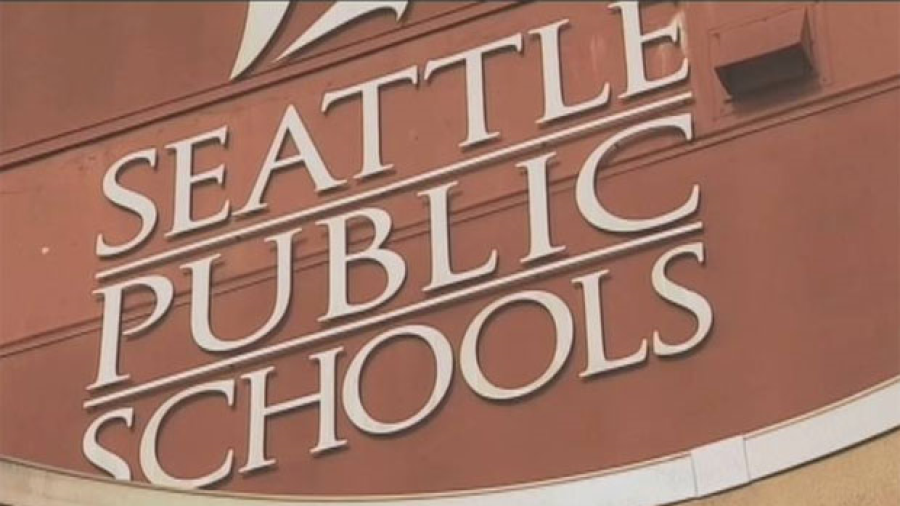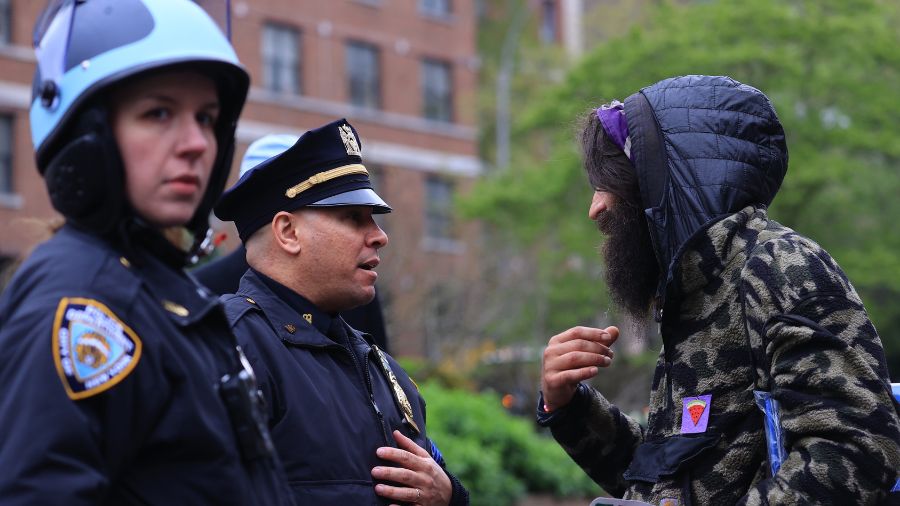Rantz: Seattle Public Schools budget focuses goals exclusively on black students, leaving others behind
Jun 29, 2022, 5:38 PM | Updated: 7:01 pm

Seattle Public Schools logo. (Photo courtesy of KIRO 7 TV)
(Photo courtesy of KIRO 7 TV)
Seattle Public Schools promises to be “laser-focused” on student achievement in 2022-2023 — so long as the student is black.
The district is hyper-focused on race, an approach that started in 2019. SPS intentionally separates students by race, adopting a philosophy of “targeted universalism,” which argues that if you treat everyone equally, it might deepen inequality between groups. The district’s new $1.14 billion budget, introduced last week and up for a vote on July 6, is built to bolster its three race-based goals. Each one is centered around black boys.
SPS believes black boys are underachieving academically because of “broken systems” that the district vows to fix, “undoing legacies of racism in public education” in the process. But the district’s priorities leave non-black struggling students behind. White students, specifically, are not part of the goal of moving students towards “educational justice” at all.
Rantz: District reclassified Asians with whites when they did too well academically
Seattle Public Schools focuses on black boys
SPS has outlined three main goals for student outcomes. They are centered around “students of color,” but the 2019-2023 strategic goal is “laser-focused” on black boys.
Each goal is meant to help black boys reach higher proficiencies in English language and math, and higher graduation rates, and advanced course enrollment and completion. The district argues black boys are ” furthest away from educational justice,” a nebulous term the district uses as it tries to combat unnamed “legacies of racism” at Seattle public schools.
Though the goals focus on student achievement, the district says they will not try to change students. Instead, it aims to change systems as it becomes “an anti-racist educational system.”
From a budgetary standpoint, SPS hopes to achieve goals by funding equity programs like Kingmakers and curricula like Black Studies.
Call black boys ‘King’
SPS plans to expand an equity program called Kingmakers of Seattle. It’s managed by the district’s Office of African American Male Achievement (AAMA).
The elective program exclusive to black middle and high school students started at four schools, but quickly expanded across the district.
As part of the program, black students are referred to as “Kings” and the curriculum is meant to affirm their identity.
“Kingmakers is structured around Khepera, an African-centered curriculum that emphasizes studying Black history, increasing literacy, building self-esteem, and offering academic mentoring,” according to the SPS description of the program.
Rantz: Democrat councilmember argues against school safety, mental health focus
Dismantling systems of oppression
The district’s AAMA was launched in 2019, in conjunction with the district’s race-based five-year strategic plan. The current budget proposal offers $1.2 million allocation to this office.
As the name suggests, AAMA focuses exclusively on black boys and teens. It aims to “reconstruct school systems and structures to meet their unique needs.” Its goal is to “dismantle the systemic racism embedded in the public education system.”
The office works to see black students treated differently than non-black students. They focus on eliminating suspensions and expulsions, replaced by a process for “reconciliation and healing.”
But it also dances around the idea of racially segregated classrooms where black teachers instruct black students.
“We need people who look like our children to be mentors, to
be an advocate for them, to run interference for them, to just love on them during the school day,” an AAMA report says.
If this isn’t an argument for race-based classrooms, it’s an argument for classrooms that benefits one group of students over the other. If black students do better with black staff, do Asian students do better with Asian teachers? If black students struggle with white teachers, do Latino students struggle with black teachers?
Black and Ethnic Studies
SPS expanded student access to a number of identity-based courses, including Black Studies, Ethnic Studies, American Indian Studies, and LGBTQIA+ studies.
The district says expanding access was “critical to our racial equity work and the commitment we have made to our community – particularly our students of color.” Though the courses are open to all students, the district website says they are “strongly encouraged for Black and Brown students.”
Many of the courses are non-controversial — at least as judged by the course description. 10th grade Black Studies World History, for example, offers an “understanding of the human dynamics that led to the enslavement and subsequent freedom of Black people around the world.”
But when you dive into the specific coursework, it’s rife with left-wing buzzwords and politicization. Indeed, the district says the work is meant to “decolonize” social studies. Other coursework is centered around “Black economics,” “Black politics,” and “Black psychology.”
Rantz: Teacher levels ‘veiled threat’ against parents on LGBT lesson plan
Targeted Individualism explains the race-based approach
Why the focus on black boys? Their academic performance is on par with Latino students.
And their share of the population is nearly identical to other races. Black students represent roughly 14% of the student population, on par with Asian (13%) and Latino (13%).
Why not treat everyone the same and focus on underachievers across the board? SPS won’t say. Instead, it argues that helping this demographic will lift all students.
But the district does abide by the concept of “targeted universalism,” can explain its general approach. The district uses a video explainer created by the Othering and Belonging Institute to explain the approach.
The video argues that “treating everyone the same… can’t root out group-based discrimination, and may actually deepen inequality between groups rather than reduce it.” It complains when you provide benefits to everyone, “resources that could be targeted to groups worse off instead flow to those who are better off.” But it doesn’t explain how.
Instead, the video argues that “targeted universalism” allows institutions to tailor plans to individual groups so that they exceed.
One example is a group of students who are not proficient in English. They would perform better if the classroom instruction wasn’t designed in English.
This makes sense. But why the focus on race when it’s not tied to language differences? SPS essentially argues that different races learn differently because of cultural differences.
Additionally, using a critical race theory lens, SPS believes systems and policies in public education are inherently stacked against black students.
Inequity to get to equity
SPS continues its push toward racial equity. But in doing so, it’s acting out in racist ways, creating the very institutional racism it seeks to destroy.
It’s certainly true that different groups of students may learn in different ways. But the assumption that black students who are underachieving are somehow more deserving of focus than underachieving white or Asian students is the exact opposite of equity. They’re all worthy of assistance, and when they all do well, there’s a societal benefit. Creating policies that benefit one racial group over the other institutionalizes racism, ensuring that one group of students will be held back on the basis of skin color.
Is it even true that all black students learn differently than Latino or white students? SPS suggests they do, while also blaming underachievement on unnamed racist policies. Which is it? Both?
If students do better in classrooms taught by staff that look like them, perhaps SPS should disrupt that reality and work on approaches that are universal so that you’re not making an argument for racially segregated classrooms. But the district is going in the opposite direction. The SPS approach, at least as it relates to black students, is a hyperfocus on bolstering identity. That seems like the wrong approach. Perhaps SPS can help all academic underachievers, regardless of race, and help create that colorblind society that was once the ideal.
Listen to the Jason Rantz Show weekday afternoons from 3–6 pm on KTTH 770 AM (HD Radio 97.3 FM HD-Channel 3). Subscribe to the podcast here. Follow @JasonRantz on Twitter, Instagram, and Facebook. Check back frequently for more news and analysis.














